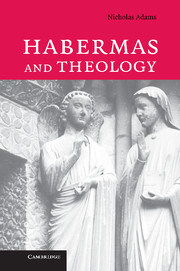Book contents
- Frontmatter
- Contents
- Preface
- 1 Religion in public
- 2 The ideal speech situation
- 3 Authority and distance in tradition
- 4 Sacred and profane
- 5 Universalism
- 6 Theology and political theory
- 7 Theology, social theory and rationalisation
- 8 Modernity's triumph over theology
- 9 Habermas in dialogue with theologians
- 10 Narrative and argument
- 11 Scriptural difference and scriptural reasoning
- List of references
- Index
5 - Universalism
Published online by Cambridge University Press: 23 December 2009
- Frontmatter
- Contents
- Preface
- 1 Religion in public
- 2 The ideal speech situation
- 3 Authority and distance in tradition
- 4 Sacred and profane
- 5 Universalism
- 6 Theology and political theory
- 7 Theology, social theory and rationalisation
- 8 Modernity's triumph over theology
- 9 Habermas in dialogue with theologians
- 10 Narrative and argument
- 11 Scriptural difference and scriptural reasoning
- List of references
- Index
Summary
Habermas' defence of universalism is not self-explanatory. It is much easier to critique universalist positions than to advance them, and given the significant number of lethal criticisms of Habermas' version of universalism, it might seem a puzzle that he sustains his attempt nonetheless. The broad outlines of the arguments will be summarised before looking at two essays in which Habermas presents arguments about universalism and – more importantly for this study – the role that theological roots play in it.
By ‘universalism’ I mean the attempt to identify dimensions of human action that are the same for all actors, regardless of local context or history. Habermas describes his universalist ethics as a continuation and transformation of religious worldviews. The problem of religious worldviews, for Habermas, is that they are irreducibly particular, and that their own universal claims are far from universalist in his sense. The universal claims made in Christian worship (e.g. ‘Christ died for all’) are raised, evaluated and redeemed within that tradition, and are not universalisable beyond Christianity. We are interested in the gains Habermas attributes to universalism, over against the particularity of traditions, so it is important to be clear how he transcends these particularities. Beyond this, it is possible that some forms of theological reasoning tend towards neither universalism nor its opposite but, under modern conditions, seek an alternative to narrating from within only one tradition the universal or the impossibility of the universal.
- Type
- Chapter
- Information
- Habermas and Theology , pp. 92 - 105Publisher: Cambridge University PressPrint publication year: 2006

